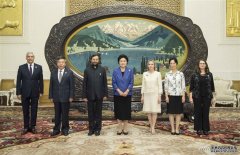Early music training benefits infants' speech learning: stud
WASHINGTON, April 25 (Xinhua) -- Early music training may not only support the development of music perception in infants, but also benefit their speech learning, a U.S. study said Monday.
The study, published in the U.S. journal Proceedings of the National Academy of Sciences, showed that a series of music lessons improved nine-month-old babies' brain processing of both music and new speech sounds.
"Our study is the first to demonstrate that a type of enriched experience with sound other than language can influence infants' speech sound processing," lead author Tian Christina Zhao, a postdoctoral researcher at the University of Washington's Institute for Learning & Brain Sciences (I-LABS), told Xinhua.
"This is also the earliest age to our knowledge that music experience has been demonstrated to have effects that extended to speech processing," Zhao said. "We know that babies learn rapidly from a wide range of experiences and we think music can be an important experience that may influence their brain development."
The I-LABS researchers designed a randomized-controlled experiment to see if teaching babies a musical rhythm would help the babies with speech rhythms.
Over the course of a month, 39 babies attended 12 15-minute play sessions in the lab with their parents.
In the 20 babies assigned to the music group, recordings of children's music played while an experimenter led the babies and their parents through tapping out the beats in time with the music.
All the songs were in triple meter -- like in a waltz -- which the researchers chose for being relatively difficult for babies to learn.
The 19 babies in the control group played with toy cars, blocks and other objects that required coordinated movements without music.
"In both the music and control groups, we gave babies experiences that were social, required their active involvement and included body movements -- these are all characteristics that we know help people learn," Zhao said. "The key difference between the play groups was whether the babies were moving to learn a musical rhythm."
At the end of the experiment, the researchers measured the infants' brain responses using a technique called magnetoencephalograph to see the precise location and timing of brain activity.
While sitting in the brain scanner, the babies listened to a series of music and speech sounds, each played out in a rhythm that was occasionally disrupted. The babies' brains would show a particular response to indicate they could detect the disruption.
The researchers focused their analyses on two brain regions, the auditory cortex and the prefrontal cortex, which is important for cognitive skills such as controlling attention and detecting patterns.
Babies in the music group had stronger brain responses to the disruption in both music and speech rhythm in both the auditory and the prefrontal cortex, compared with babies in the control group.
This suggests that participation in the play sessions with music improved the infants' ability to detect patterns in sounds, the researchers said.
"Pattern perception is an important cognitive skill," co-author Patricia Kuhl, co-director of I-LABS, said in a statement. "Improving that ability early may have long-lasting effects on learning."















